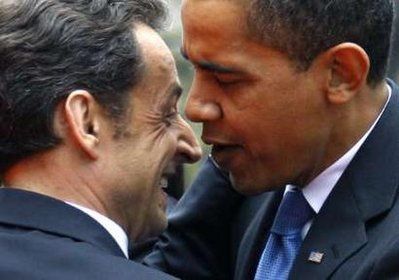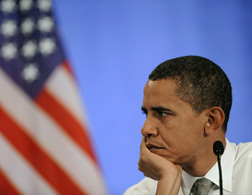
Tensions in "Special Relationship" Between France and U.S.
As a guest in the country, Obama naturally praised France and its president warmly. Before journalists, Obama and Sarkozy appeared friendly, but Obama is apparently reluctant to express unlimited warmth. Participating in commemoration ceremonies in Normandy has been the standard practice for American presidents since the eighties, and Obama is no exception. However, America will not attach any kind of special meaning to this visit, as can be seen from the trip’s schedule.
Obama arrived in Paris on the evening of June 5th. According to prior arrangements between the time of his arrival and the afternoon of June 6th, he would remain in Paris. As the French media reported, Sarkozy initially wanted to invite Obama to the Palais de l’Elysée for a formal welcoming ceremony on the morning of June 6th in order to give Obama’s visit more of an official character. The French officials entreated Obama to attend, but the American side would not agree to this arrangement. Obama maintained that he had come to France in order to participate in the commemoration ceremony, and so the formal welcoming ought to take place in Normandy. Even more unthinkable was that Obama stayed in the official residence of the American ambassador to France while in Paris. The ambassador’s residence is right next to the Palais de l’Elysée, but Sarkozy and Obama would have to wait until the next day to meet. It looks as though America had decided to reject Sarkozy’s welcome.
It is well known that, because of disagreements over the Iraq War, relations between America and France have been cold in recent years. In his campaign for president, Sarkozy advocated strongly for improved relations between the two countries. As president, Sarkozy often took risks on the international stage, and in using his own diplomatic skill, elevated France’s international status. Towards the end of Bush’s presidency, Sarkozy took advantage of American diplomacy’s “open schedule” to great effect. Especially during negotiations at the European Union, Sarkozy successfully negotiated a resolution to the arms conflict between Russia and Georgia. France was also instrumental in the twenty-nation economic summit last year. Because of its excellent performance during its time as the leader of the EU, France enjoys the approval of other EU members. As a result, Sarkozy’s motivation and enthusiasm have increased. However, President Obama is now the new star, eclipsing Sarkozy. As a result, he wishes to cultivate a “special relationship” with America in order to keep his own limelight bright. Thus, when Obama became president, Sarkozy tried very hard to be Obama’s first guest at the White House. But the Obama White House obviously did not want to give him this opportunity, and instead welcomed Prime Minister Brown as its first guest. Obama’s visit to Normandy offers further insight into this same problem.
Analysts have pointed out that although France has extended goodwill towards America for some time and has also recently returned to the command structure of NATO’s military, there remain difficulties in Franco-American relations. The reason is simple: at this time, America’s most valued diplomatic relations are not in Europe, and France is no exception. Europe and America have close economic ties, but political relations remain forced. Under these circumstances, France’s “special relationship” with America is merely a product of Sarkozy’s wishful thinking.


